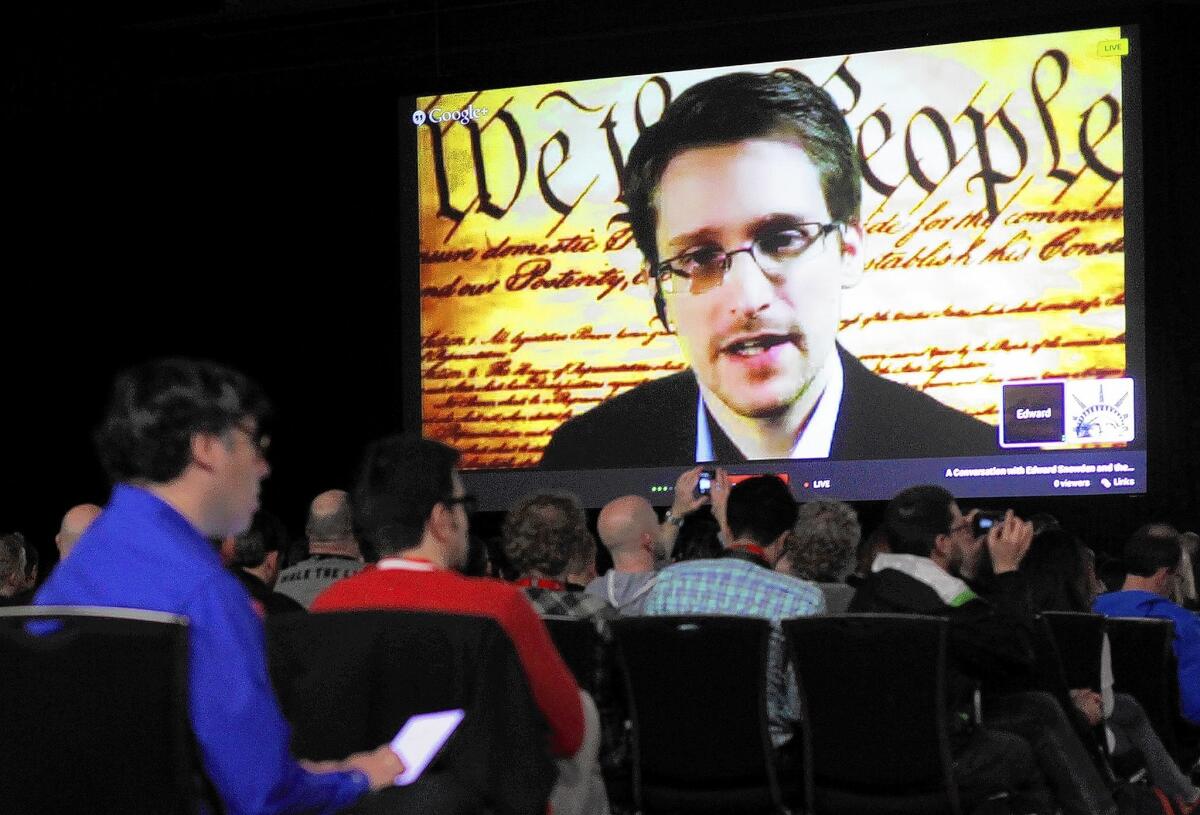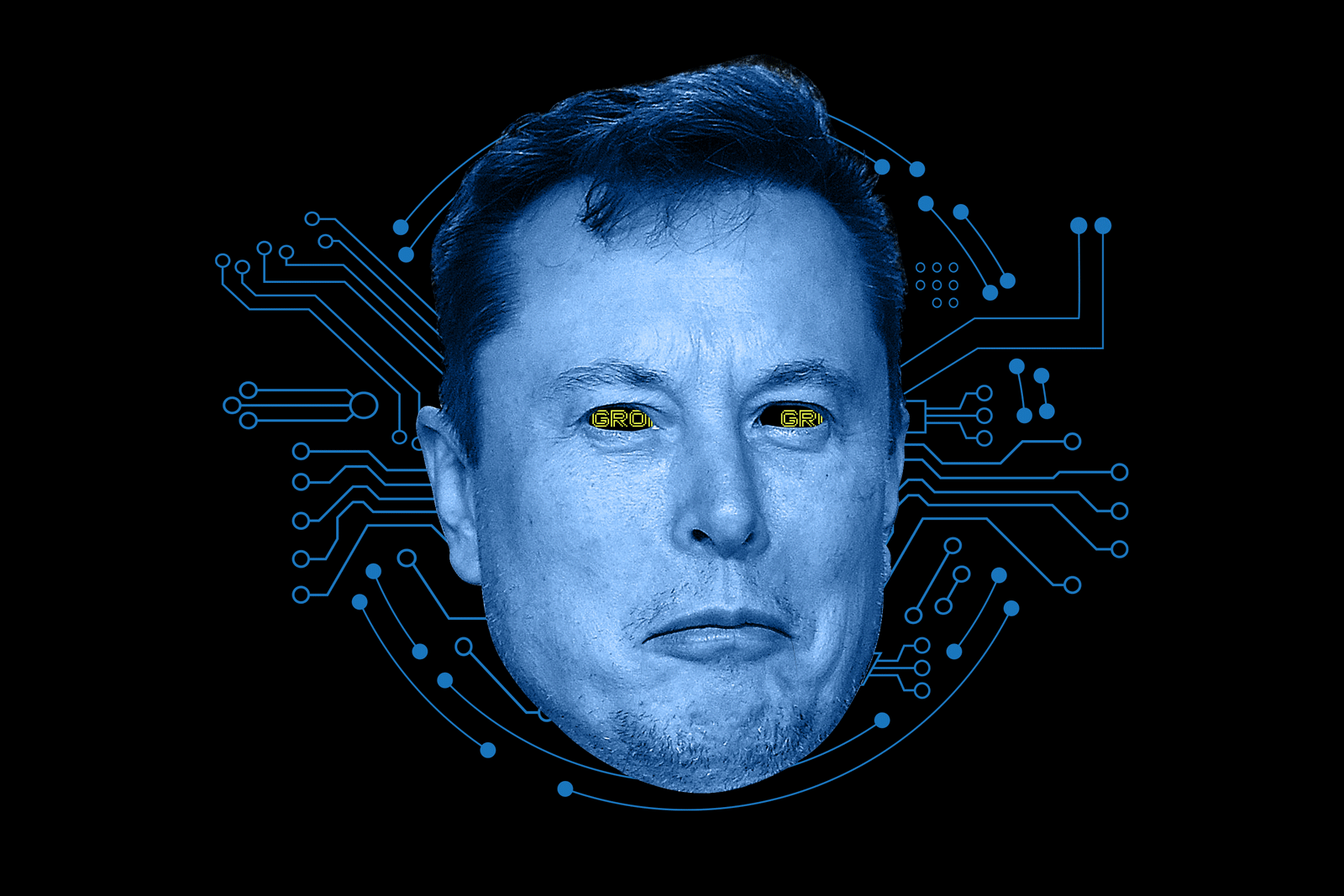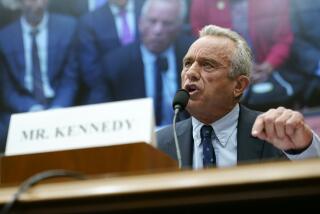Edward Snowden warns of personal data vulnerability

AUSTIN, Texas — Edward Snowden brought no bombshells when he arrived to an excited round of applause Monday, his stubbled face relaxed as it was beamed in from across the continents for a “virtual conversation” about the vulnerability of personal data. His presence was event enough.
Public appearances by the former National Security Agency contractor and U.S. exile are rare, and this one was beamed in from an undisclosed location in Russia via several online proxies for his own security, a bit of technological cloak-and-dagger that could only add to his mystique for the three roomfuls of international tech specialists struggling to hear his words in video that was choppy and often inaudible.
His message still got through: Personal information is vulnerable not only to government prying but to growing numbers of outside infiltrators because companies have failed to adequately protect the data of their customers. His own exile after leaking to reporters secret information he had gathered while an NSA consultant has made him a central figure in that conversation, and he says he has no regrets.
“Would I do it again? Absolutely,” Snowden said into the camera, in response to one of several questions submitted to him via Twitter (#AskSnowden) and screened backstage at the South by Southwest Interactive conference. “I took an oath to support and defend the Constitution. And I saw the Constitution was being violated on a massive scale.”
He warned, “If we allow the NSA to continue unrestrained, every other government will accept that as a green light to do the same.”
The chosen Twitter questions were notably nonconfrontational for a figure often the subject of heated debate even among supporters. One asked whether the mass surveillance was driven by privatization. Another wondered about the potential for society to “reap benefits” from the “big data.” None asked about his life in Russia, or what further revelations might be coming.
The first question came from Timothy John Berners-Lee, a British scientist known as the inventor of the World Wide Web, who asked Snowden how he would create an accountability system for governance.
“We have an oversight model that could work. The problem is when the overseers are not interested in oversight,” Snowden said. “The key factor is accountability.”
Onstage in Austin, lawyer Ben Wizner and ACLU principal technologist Chris Soghoian conversed with Snowden as he appeared on a big screen, an image of the U.S. Constitution superimposed behind him. The three agreed that an easier means for citizens to encrypt their data was a pressing need.
“Most regular people are not going to download an obscure encryption app,” Soghoian said. He also noted that “without Ed’s disclosures, a lot of tech companies would not have improved cybersecurity.”
Snowden said, “We need to think of encryption not as a dark art,” and warned that the NSA was “setting fire to the future of the Internet. And the people in this room, you guys, are the firefighters.”
For his audience, Snowden’s choice of the SXSW conference to directly address his peers in data technology was easy to understand.
“You have people from every major media company, every major brand, every major agency,” Ryan Kite, a director of digital strategy for Los Angeles-based marketing agency TVGla, said after Snowden’s hourlong talk. “Where else would you get a message like that out there to people who actually move and control the data?
“He was insightful,” Kite added. “He made me think about privacy versus functionality. He was a good predictor about what’s happening. We have a choice — which path do we go down? Do we go down that path of free and easy with no liberty and complete openness to all of our data? Or do we switch and take preventative measures and secure everything?”
While not as excited a crowd as that gathered this week to hear Lena Dunham’s keynote speech at the SXSW Film conference — that line was much longer — Snowden’s audience was a nearly full house of 3,000. Tech registrants steadily entered the hall to hushed electronic music. In front of the stage, an artist drew a running comic on the issues being discussed.
Hans Meier, a teacher of interactive design at Oslo School of Architecture and Design in Norway, said Snowden seemed “like a sympathetic person. Maybe not as a leader. What he’s done is such a breakthrough thing, and he’s got so many enemies, so for him there will always be this buzz whenever he comes on. But he’s broken ground for a lot of other people to speak out. He’s made these companies actually tighten up the security.”
Snowden has kept a low profile of late — he faces felony charges of espionage and theft of government property — and has said he won’t return until the United States changes its whistle-blower protection laws.
Atty. Gen. Eric H. Holder Jr. has taken a strong stand against granting amnesty to Snowden, saying he caused harm to national security and should be held accountable. Holder has described him as a defendant, not a whistle-blower.
Barton Gellman, a Washington Post reporter who has worked with Snowden, released a video of his own ahead of Snowden’s appearance. He said Snowden wanted to speak with “the people who are building and creating the next generation of the Internet” because “technologists” are “a group he wants to influence.”
“He’s looking for places where there can be reform” to “practices that he regards as overbroad and overly intrusive,” Gellman said.
Times staff writer Molly Hennessy-Fiske in Houston contributed to this report.
More to Read
Sign up for Essential California
The most important California stories and recommendations in your inbox every morning.
You may occasionally receive promotional content from the Los Angeles Times.










